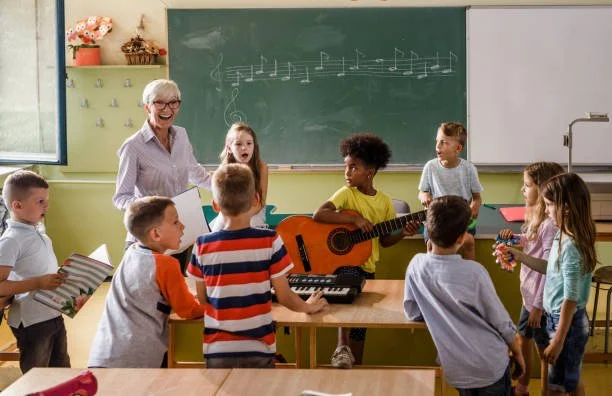Introduction
Music has always been integral to human culture, connecting people through shared emotions, stories, and experiences. Teaching music in schools not only preserves this rich tradition but also offers many benefits for students and educators alike. This article explores the cognitive, emotional, and social advantages of music education, as well as the positive impact it has on educators themselves.
The Cognitive Benefits of Music Education
Enhancing Brain Development
Engaging in musical activities stimulates various brain areas, such as those responsible for auditory processing, motor control, and spatial-temporal reasoning. Research has shown that students who participate in music education demonstrate increased neural connectivity and enhanced cognitive abilities, including problem-solving, critical thinking, and decision-making skills.
Improving Memory and Learning
Music education also plays a significant role in boosting memory and learning capabilities. When students learn to play an instrument, memorize sheet music, or sing lyrics, they exercise their working memory and enhance their ability to retain and recall information. This skill translates to other subjects, ultimately contributing to overall academic success.
Boosting Creativity
Learning to play a musical instrument or engage in other artistic endeavors allows students to express themselves creatively. This freedom of expression fosters innovative thinking and encourages students to approach problems from different perspectives. By nurturing creativity, music education equips students with the tools to think outside the box and excel in various facets of life.
The Emotional Benefits of Music Education
Strengthening Emotional Intelligence
Music has a unique ability to evoke and express emotions. By participating in music education, students develop a deeper understanding of their emotions and learn how to communicate them effectively. This emotional intelligence helps students navigate their personal lives, build healthy relationships, and cope with stress and anxiety.
Encouraging Self-Expression
Music education provides students with a creative outlet for self-expression. Whether playing an instrument, composing original pieces, or singing, students can communicate their thoughts, feelings, and experiences through music. This self-expression fosters confidence, self-esteem, and personal growth.
Building Resilience
Learning a musical instrument or mastering a vocal technique can be challenging and requires persistence and determination. As students overcome obstacles and setbacks, they develop resilience and grit, qualities that help them confidently face future challenges.
The Social Benefits of Music Education
Developing Communication Skills
Playing music in a group setting requires effective communication between ensemble members. Students must listen attentively to each other and respond accordingly to maintain harmony and rhythm. By participating in music education, students develop strong listening and communication skills essential for personal and professional success.
Fostering Teamwork and Collaboration
Music ensembles, whether orchestras, bands, or choirs, rely on the cooperation of each individual to achieve a harmonious performance. Students learn the importance of teamwork, compromise, and collaboration to create beautiful music. These valuable skills translate to other aspects of life as students learn to work effectively with others in various settings.
Promoting Empathy and Cultural Awareness
Music transcends cultural boundaries and connects students with diverse perspectives and traditions. By learning about the theme of different cultures, students gain a deeper appreciation for the rich tapestry of human expression and develop empathy for others. Music education fosters global citizenship, preparing students to thrive in an increasingly interconnected world.
The Benefits for Educators
Teaching Music as a Rewarding Experience
Educators who teach music have the unique opportunity to inspire and empower students through artistic expression. They witness firsthand the transformative power of music as it shapes students’ cognitive, emotional, and social development. This rewarding experience can bring immense satisfaction and fulfillment to music educators.
Personal Growth and Professional Development
Teaching music allows educators to hone their musical abilities and deepen their understanding of the subject matter. This personal growth contributes to their professional development, making them more effective and knowledgeable teachers. Moreover, music educators often serve as role models, inspiring students to pursue their passions and embrace the joys of learning.
Encouraging Lifelong Learning
Music education is a dynamic field that constantly evolves with new research, pedagogical methods, and technological advancements. As a result, music educators must commit to lifelong learning to stay current and provide the best possible education for their students. This dedication to continuous improvement not only benefits the students but also enriches the educators’ lives.
Conclusion
Teaching music matters because it offers a myriad of benefits for both students and educators. Music education enhances cognitive abilities, fosters emotional intelligence, and nurtures social skills. Moreover, it provides educators with rewarding experiences, personal growth, and professional development opportunities. We can cultivate a more creative, empathetic, and collaborative society by embracing music education.
FAQs
- How does music education benefit cognitive development?
- Music education stimulates various brain areas, enhances neural connectivity, and improves cognitive abilities such as problem-solving, critical thinking, and decision-making.
- What are the emotional benefits of music education?
- Music education strengthens emotional intelligence, encourages self-expression, and builds resilience in students.
- How does music education promote social skills?
- Music education helps develop communication skills, fosters teamwork and collaboration, and encourages empathy and cultural awareness.
- Why is teaching music rewarding for educators?
- Teaching music is rewarding because it allows educators to witness the transformative power of music in students’ lives and experience personal growth and professional development.
- How does music education encourage lifelong learning for educators?
- Music education is a dynamic field that requires educators to stay current with new research, pedagogical methods, and technological advancements, fostering a commitment to lifelong learning.
